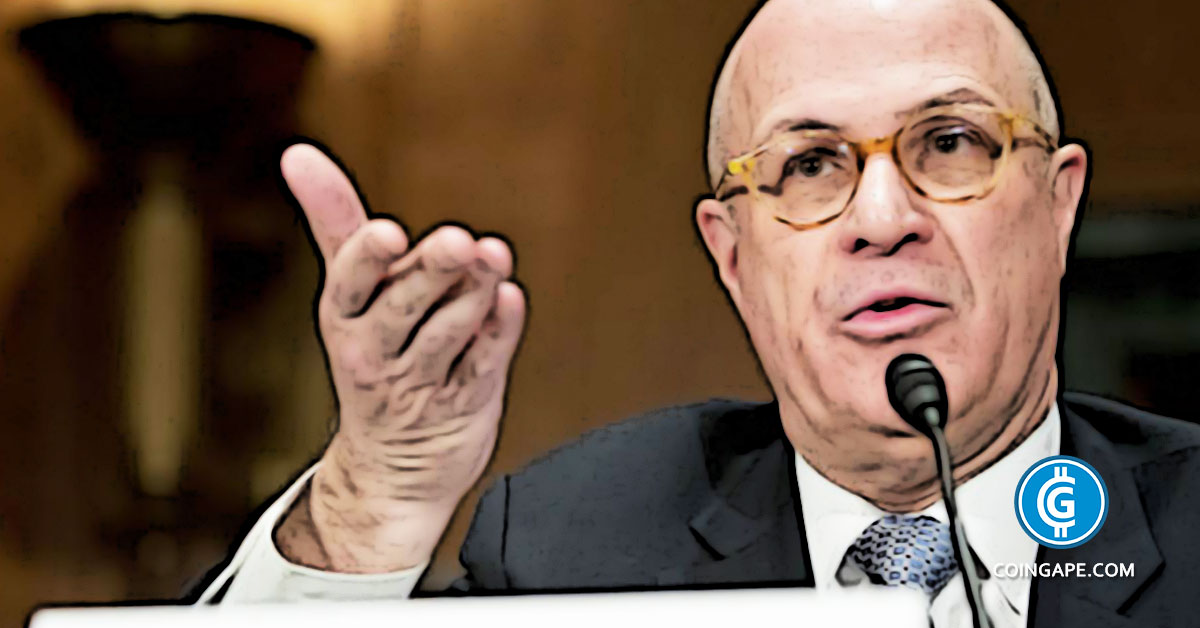24/7 Cryptocurrency News
Ripple CTO David Schwartz Dismisses CharacterAI Lawsuit
Published
4 weeks agoon
By
admin
Ripple CTO David Schwartz has dismissed the legal case against Character.AI, asserting that it lacks merit under U.S. law. Schwartz expressed his views on social media, emphasizing that while he does not defend Character.AI’s moral responsibility, the legal arguments made against the company are flawed.
Ripple CTO David Schwartz’s Argument on Free Speech
In a post on X (formerly Twitter), Ripple CTO David Schwartz highlighted that Character.AI’s actions fall under the protection of the First Amendment. He argued that the company’s chatbot platform produces expressive content, which remains protected unless it falls into one of the narrowly defined categories of unprotected speech, such as incitement or direct threats.
According to Schwartz, the lawsuit’s complaint revolves around the idea that Character.AI was reckless in how it designed its platform to generate speech.
He stated, “Any argument that the expressive contents of protected speech are reckless, dangerous, or ‘defective’ is wholly incompatible with freedom of speech.”
Schwartz compared the situation to previous moral panics over new forms of media, suggesting that the legal challenge against Character.AI mirrors past controversies involving video games, comic books, and other expressive content. He emphasized that regulating how speech is chosen would conflict with constitutional rights.
The Character.AI Lawsuit and Its Claims
The lawsuit, filed by the mother of a 14-year-old boy named Sewell Setzer III, accuses Character.AI of negligence, wrongful death, deceptive trade practices, and product liability. It alleges that the platform is “unreasonably dangerous” and lacked adequate safety measures, despite being marketed to minors.
The suit also references the company’s chatbots, which simulate characters from popular media, including TV shows like Game of Thrones. Setzer had reportedly interacted with these chatbots extensively before his death.
Character.AI’s founders, Noam Shazeer and Daniel De Freitas, along with Google, which acquired the company’s leadership team in August, are named in the lawsuit. The plaintiff’s lawyers claim that the platform’s anthropomorphization of AI characters and chatbots offering “psychotherapy without a license” contributed to Setzer’s death.
The company has responded with updates to its safety protocols, including new age-based content filters and enhanced detection of harmful user interactions.
Character.AI’s Response and Policy Changes
Character.AI has implemented several changes to improve user safety in response to the incident and subsequent lawsuit. These updates include modifications to content accessible by minors, a reminder pop-up that alerts users that the chatbots are not real people, and a notification system for users who spend prolonged time on the platform. The company’s communications head, Chelsea Harrison, stated,
“We are heartbroken by the tragic loss of one of our users and want to express our deepest condolences to the family.”
Harrison further explained that the platform now has improved detection systems for user inputs related to self-harm or suicidal ideation, which direct users to the National Suicide Prevention Lifeline. Despite these efforts, the legal battle continues, with Character.AI maintaining that it remains committed to user safety.
Meanwhile, the Aptos Foundation has announced a new partnership with Flock IO to develop AI tools using the Move programming language. Move, originally designed by Meta for the Diem project, is now being adapted for broader blockchain applications.
Kelvin Munene Murithi
Kelvin is a distinguished writer with expertise in crypto and finance, holding a Bachelor’s degree in Actuarial Science. Known for his incisive analysis and insightful content, he possesses a strong command of English and excels in conducting thorough research and delivering timely cryptocurrency market updates.
Disclaimer: The presented content may include the personal opinion of the author and is subject to market condition. Do your market research before investing in cryptocurrencies. The author or the publication does not hold any responsibility for your personal financial loss.
Source link
You may like


Bitcoin Approaches $100K; Retail Investors Stay Steady


Solana Hits New ATH On Huge Whale Accumulation, More Gains Ahead?


Microsoft Should Buy $78 Billion Worth of Bitcoin


Ethereum Believers May Be Staring Down Opportunity As ETH Reaches Another Low Against Bitcoin: CryptoQuant CEO


UK government is ready for crypto regulations next year


“Crypto Dad” Chris Giancarlo Emerges Top For White House Crypto Czar Role
24/7 Cryptocurrency News
Solana Hits New ATH On Huge Whale Accumulation, More Gains Ahead?
Published
1 hour agoon
November 22, 2024By
admin
Solana has once again caught the attention of market participants as it hit a new ATH on Friday. Notably, SOL witnesses a sustained rally against the backdrop of massive whale accumulations. Now, as the crypto is noting a buying pressure amid the bull market, market watchers anticipate further gains in the crypto ahead.
Solana Hits New ATH Amid Massive Whale Buying
According to data by Lookonchain on November 22, whales continue to accumulate Solana amid its upside movement to a new ATH. According to the data, a fresh wallet was recorded accumulating 42,443 SOL, worth $11.14 million, from Binance over the past two days. This accumulation was made by the wallet address “Au1VJ…q8hF8”, per Solscan’s data.
Simultaneously, another massive accumulation recorded over the past day has weighed the scales toward the bullish side of the asset. Lookonchain revealed that a whale bagged 100K SOL, worth $23.86 million, and staked it over the last two days. Notably, Solscan’s data showed this whale address as 7L1HBfMH.., while the whale’s SOL holdings totaled $55.58 million.
Overall, these accumulations, underscoring increased buying pressure on the asset, birthed significant market optimism on future price movements. For context, large-scale investors’ accumulations signaled heightened market confidence in the asset’s potential to offer gains ahead.
Moreover, with the soaring odds of a Solana ETF further weighing in, the current market sentiment for one of the leading crypto by market cap remains highly bullish. A recent CoinGape Media report further revealed that the SEC has now started engaging with the SOL ETF issuers regarding the filed S-1 registration statements. Besides, Bitwise has also filed for Solana ETF recently, further fueling market interest.
Coin Price Gians 8% Breaking ATH
SOL price today witnessed gains worth 8% intraday and was trading at $262.51 at the time of reporting. The coin’s 24-hour low was $237.33, whereas the current price level marked a new ATH. Notably, the weekly chart illustrated a 26% pump for the coin, followed by a monthly upswing of 59%. This bullish movement falls in line with massive buying pressure on the asset, as seen by the abovementioned whale transactions.
Simultaneously, Coinglass data indicated that the coin’s futures OI surged 15% to $6.01 billion. Moreover, the derivatives volume noted a 61% uptick to $19.03 billion. Overall, this stat indicated a burgeoning market interest in the asset, further paving an optimistic path for future price movements.
Also, a recent Solana price analysis by CoinGape Media pointed out that the coin eyes a $5,000 price target as it has already noted a significant surge from its 2023 lows. Crypto market watchers continue to monitor the token for further price action shifts in light of the abovementioned statistics.
Coingape Staff
CoinGape comprises an experienced team of native content writers and editors working round the clock to cover news globally and present news as a fact rather than an opinion. CoinGape writers and reporters contributed to this article.
Disclaimer: The presented content may include the personal opinion of the author and is subject to market condition. Do your market research before investing in cryptocurrencies. The author or the publication does not hold any responsibility for your personal financial loss.
Source link
24/7 Cryptocurrency News
“Crypto Dad” Chris Giancarlo Emerges Top For White House Crypto Czar Role
Published
5 hours agoon
November 22, 2024By
admin
Chris Giancarlo, widely known as “Crypto Dad,” has emerged as the leading candidate for a newly proposed role of crypto czar in the White House under President-elect Donald Trump’s administration. The potential appointment underscores a strategic effort to advance crypto regulations and foster blockchain innovation in the United States.
This proposed position would be the first of its kind in the White House, aiming to bring clarity to the growing $3 trillion digital asset market. Chris Giancarlo, the former Chair of the Commodity Futures Trading Commission (CFTC), is known for his progressive approach to digital currencies and blockchain technologies.
Chris Giancarlo Leads Race for White House Crypto Czar Role Under Donald Trump
According to a Fox Business report, Chris Giancarlo is the top contender for the position of White House crypto czar, a role being considered by the Trump transition team to streamline crypto regulations and foster blockchain development.
As CFTC Chair from 2017 to 2019, Chris Giancarlo oversaw critical advancements in the digital asset space. This includes the launch of the first Bitcoin futures. He later co-founded the Digital Dollar Project, a nonprofit initiative exploring the potential of a U.S. central bank digital currency (CBDC). Giancarlo’s regulatory expertise and understanding of digital innovation position him as a key figure in shaping the future of the crypto sector.
The Trump administration aims to utilize this position to address industry concerns over the Biden administration’s perceived heavy-handed enforcement. The crypto czar would also collaborate with federal agencies to establish a framework for the $180 billion stablecoin market and enhance the overall regulatory landscape for blockchain and digital currencies.
Trump’s Strategic Approach to Digital Asset Policy
President-elect Donald Trump has expressed plans to make the U.S. a global leader in cryptocurrency and blockchain innovation. Part of this strategy includes appointing a crypto czar to advance policies to support the industry’s growth.
Trump has also proposed the establishment of a presidential crypto advisory council to address ongoing regulatory challenges. This initiative aims to align federal policies with industry needs, fostering a competitive environment for blockchain businesses. The council will explore the creation of a Bitcoin reserve as part of the administration’s broader crypto policy agenda.
The transition comes as current SEC Chair Gary Gensler announced his resignation effective January 20, 2025, coinciding with Trump’s inauguration. Gensler faced criticism during his tenure for his enforcement-driven approach to crypto regulations.
Amid speculation, Chris Giancarlo clarified that he is not pursuing the SEC Chair role. Giancarlo said in a recent statement,
“I’ve already cleaned up earlier Gary Gensler mess at the CFTC and don’t want to have to do it again.”
His focus remains on advancing crypto-friendly policies through a potential new role. According to the report, the “Crypto Dad” stated,
“I would be honored to be considered for the role.”
The creation of the crypto czar position could mark a pivotal moment in the evolution of U.S. crypto policy. With Chris Giancarlo leading the race, the industry anticipates advancements in crypto regulations under the new administration.
Ronny Mugendi
Ronny Mugendi is a seasoned crypto journalist with four years of professional experience, having contributed significantly to various media outlets on cryptocurrency trends and technologies. With over 4000 published articles across various media outlets, he aims to inform, educate and introduce more people to the Blockchain and DeFi world. Outside of his journalism career, Ronny enjoys the thrill of bike riding, exploring new trails and landscapes.
Disclaimer: The presented content may include the personal opinion of the author and is subject to market condition. Do your market research before investing in cryptocurrencies. The author or the publication does not hold any responsibility for your personal financial loss.
Source link
24/7 Cryptocurrency News
Donald Trump Proposed Crypto Advisory Council To Set Up Strategic Bitcoin Reserve
Published
9 hours agoon
November 21, 2024By
admin
Donald Trump plans to establish an advisory council to position the U.S. as a leader in the cryptocurrency space. The council will spearhead policy changes, coordinate with Congress on crypto legislation, and oversee the creation of a strategic Bitcoin reserve.
The advisory council will also operate under the White House’s National Economic Council or a similar executive body. Industry executives have revealed that the council will collaborate with federal agencies like the Securities and Exchange Commission (SEC), Commodity Futures Trading Commission (CFTC), and the Treasury to streamline regulatory frameworks for the crypto industry.
Donald Trump To Establish Bitcoin Reserve Amid Crypto Council Formation
According to a recent report, Donald Trump’s crypto advisory council will advise on digital asset policies and oversee the creation of a strategic Bitcoin reserve. The reserve aims to position Bitcoin as a core element of the United States’ economic strategy. This will enhance the nation’s leadership in the global crypto space.
The council will work with Congress to draft legislation and coordinate between agencies such as the SEC, CFTC, and Treasury. The initiative seeks to establish clear regulatory guidelines within the crypto sector. More so, the idea of a Bitcoin reserve reflects a commitment to integrating blockchain technology into national economic frameworks.
Additionally, the move comes amid rising discussions on why the United States should consider Bitcoin as part of its national reserves, particularly in light of countries like El Salvador and Bhutan already adopting it. Advocates like Anthony Pompliano stress the urgency for the U.S. to act to maintain its leadership in the evolving digital economy.
Industry Leaders Compete for Seats on Trump’s Crypto Council
Several players in the industry, including Ripple, Kraken, Coinbase, and Circle, are vying for a position on Donald Trump’s council. These companies aim to influence the administration’s approach to crypto regulation and advocate for pro-industry policies. Executives from Paradigm and Andreessen Horowitz’s crypto arm, a16z, are also expected to play key roles in shaping the council.
Ripple and Circle, represented by their executives, have already expressed interest in contributing to the council. Circle CEO Jeremy Allaire recently emphasized the importance of building a robust, crypto-friendly infrastructure under Trump’s administration. Industry leaders hope this council will bring an end to enforcement actions seen under the previous administration.
Most recently, Cardano founder Charles Hoskinson endorsed Coinbase CEO Brian Armstrong for the potential White House crypto role under Donald Trump’s administration. Hoskinson praised Armstrong’s neutrality and deep understanding of the crypto industry, emphasizing his ability to guide regulatory progress.
Meanwhile, this major push comes as the current SEC Chair, Gary Gensler, announced he is set to resign on January 20, 2025, coinciding with Donald Trump’s inauguration as U.S. President. Ripple’s CLO, Stuart Alderoty, emphasized the need for a new Chair who will establish clear rules for crypto.
Notably, former regulators, including Heath Tarbert, former CFTC Chair and now Circle’s chief legal officer, and Brian Quintenz, a16z’s head of policy, are reportedly advising Donald Trump’s transition team. These individuals bring extensive regulatory experience to the development of the Crypto Council and its proposed Bitcoin reserve.
Ronny Mugendi
Ronny Mugendi is a seasoned crypto journalist with four years of professional experience, having contributed significantly to various media outlets on cryptocurrency trends and technologies. With over 4000 published articles across various media outlets, he aims to inform, educate and introduce more people to the Blockchain and DeFi world. Outside of his journalism career, Ronny enjoys the thrill of bike riding, exploring new trails and landscapes.
Disclaimer: The presented content may include the personal opinion of the author and is subject to market condition. Do your market research before investing in cryptocurrencies. The author or the publication does not hold any responsibility for your personal financial loss.
Source link

Bitcoin Approaches $100K; Retail Investors Stay Steady

Solana Hits New ATH On Huge Whale Accumulation, More Gains Ahead?

Microsoft Should Buy $78 Billion Worth of Bitcoin

Ethereum Believers May Be Staring Down Opportunity As ETH Reaches Another Low Against Bitcoin: CryptoQuant CEO

UK government is ready for crypto regulations next year

“Crypto Dad” Chris Giancarlo Emerges Top For White House Crypto Czar Role

Bitcoin Nears $100,000 As Trump Council Expected To Implement BTC Reserve

Know Your Missiles: Russia’s Experimental Hypersonic Missile Is A New Kind of Killing Machine

Polkadot investor predicts a 30,000% rally for this $0.04 token by 2025

Donald Trump Proposed Crypto Advisory Council To Set Up Strategic Bitcoin Reserve

Want Greater Bitcoin Adoption? Engage With Your Government.

Why the Media Loves the Worst of Crypto

HashCats prepares for Token Generation Event after completing mining season

Gary Gensler To Step Down As US SEC Chair In January

The Chart That Shows Bitcoin’s Bull Run Won’t Stop at $100,000
182267361726451435

Top Crypto News Headlines of The Week

Why Did Trump Change His Mind on Bitcoin?

New U.S. president must bring clarity to crypto regulation, analyst says

Ethereum, Solana touch key levels as Bitcoin spikes

Bitcoin Open-Source Development Takes The Stage In Nashville

Will XRP Price Defend $0.5 Support If SEC Decides to Appeal?

Bitcoin 20% Surge In 3 Weeks Teases Record-Breaking Potential

Ethereum Crash A Buying Opportunity? This Whale Thinks So

Shiba Inu Price Slips 4% as 3500% Burn Rate Surge Fails to Halt Correction

‘Hamster Kombat’ Airdrop Delayed as Pre-Market Trading for Telegram Game Expands

Washington financial watchdog warns of scam involving fake crypto ‘professors’

Citigroup Executive Steps Down To Explore Crypto
Mostbet Güvenilir Mi – Casino Bonus 2024

Bitcoin flashes indicator that often precedes higher prices: CryptoQuant
Trending

 2 months ago
2 months ago182267361726451435

 24/7 Cryptocurrency News3 months ago
24/7 Cryptocurrency News3 months agoTop Crypto News Headlines of The Week

 Donald Trump4 months ago
Donald Trump4 months agoWhy Did Trump Change His Mind on Bitcoin?

 News3 months ago
News3 months agoNew U.S. president must bring clarity to crypto regulation, analyst says

 Bitcoin4 months ago
Bitcoin4 months agoEthereum, Solana touch key levels as Bitcoin spikes

 Opinion4 months ago
Opinion4 months agoBitcoin Open-Source Development Takes The Stage In Nashville

 Price analysis3 months ago
Price analysis3 months agoWill XRP Price Defend $0.5 Support If SEC Decides to Appeal?

 Bitcoin4 months ago
Bitcoin4 months agoBitcoin 20% Surge In 3 Weeks Teases Record-Breaking Potential



✓ Share: